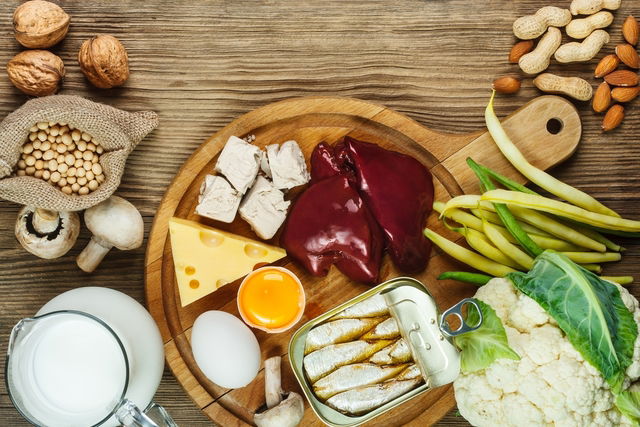Biotin, also known as vitamin H or vitamin B7, is a water soluble vitamin that is essential for the body. It is required for the production of glycogen and proteins, and helps to keep your skin and hair healthy.
This vitamin can be found naturally in foods such as almonds, hazelnuts and whole grains. However, if you are not getting enough biotin through your diet, your doctor or registered dietitian can also prescribe it as a supplement.
Learn how you can use biotin for hair growth.

Main health benefits
Biotin is an essential vitamin that has many benefits, such as:
- Being an energy source for cells, since it's essential for the production of glycogen, which also helps regulate glucose levels;
- Stimulating the production of proteins, as it aids in the formation of amino acids, which are the building blocks of proteins;
- Strengthening hair and nails, since it contributes to the production of proteins that are essential for healthy nails and hair;
- Promoting skin health, because it ensures the body produces collagen and keratin, which are essential proteins to guarantee skin elasticity and resistance;
- Increasing the reabsorption of vitamins B12, B5 and folic acid, which help to maintain optimal body functioning;
- Helping form blood cells, especially lymphocytes and antibodies.
In addition, biotin can also help keep the nervous system healthy, help in the treatment of acne and hair loss, and regulate cholesterol levels.
Foods with biotin
Biotin can be found in foods such as peanuts, almonds, chestnuts, wheat, boiled eggs, mushrooms, whole grains and hazelnuts. Biotin is also produced by natural bacteria in the intestines, therefore you should consume plenty of fiber and drink at least 6 cups (1.5 L) of water a day, to help keep the bowels healthy and encourage biotin production. See which foods are high in fiber.
The following table shows the amount of biotin found in 100 g of each food:
In addition to being found naturally in some foods, biotin can also be bought as a supplement in capsule form. Biotin supplements are usually prescribed if you're not getting enough biotin through your diet, or if you have signs of biotin deficiency such as hair loss, weak nails, loss of appetite, and fatigue.
Biotin supplements
Biotin can also be found in the form of capsules to be taken as supplements. They should only be taken as prescribed by a doctor or registered dietitian when you are unable to obtain the ideal amount of biotin through diet alone, or when you have symptoms of low biotin levels, such as hair loss, weak nails, loss of appetite and excessive tiredness.
When it is indicated
Biotin supplementation may be indicated in cases of biotinidase deficiency, insufficient intake of biotin in the diet, intestinal malabsorption, or in cases of alopecia and acne. It may also be recommended for people who want to strengthen their nails and hair and improve the appearance of the skin.
How to take
There is no specific recommendation for biotin supplements, as dosing may vary according to the purpose of use. For the treatment of brittle nails, 2.5 mg once a day for 6 months may be taken. The dose of biotin found in some multivitamins (30 mcg or 0.03 mg) is usually sufficient.
Side effects
Taking biotin supplements at the indicated dose is apparently safe and typically does not cause side effects.
Contraindications
Biotin supplement should not be used in people with hypersensitivity to any component present in the formula, and is also not recommended for pregnant or breastfeeding women, unless approved by a doctor.
